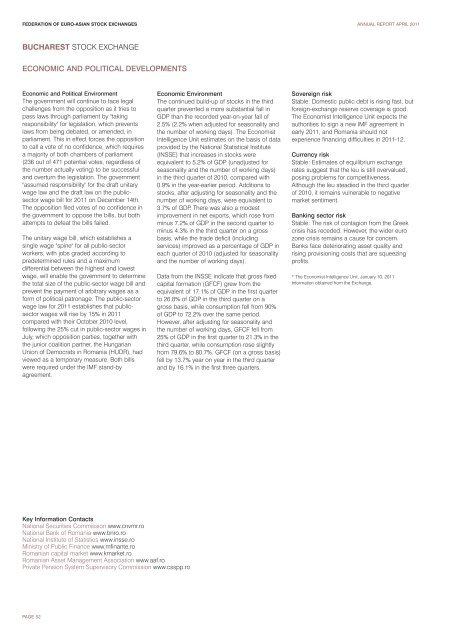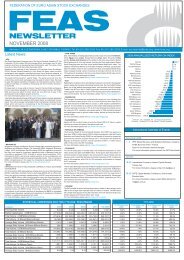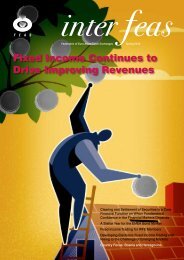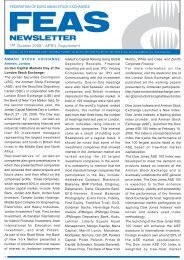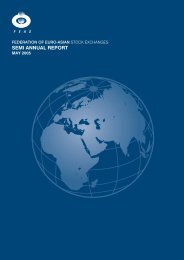Download - FEAS
Download - FEAS
Download - FEAS
Create successful ePaper yourself
Turn your PDF publications into a flip-book with our unique Google optimized e-Paper software.
FEDERATION OF EURO-ASIAN STOCK EXCHANGES ANNUAL REPORT APRIL 2011<br />
BUCHAREST STOCK EXCHANGE<br />
ECONOMIC AND POLITICAL DEVELOPMENTS<br />
Economic and Political Environment<br />
The government will continue to face legal<br />
challenges from the opposition as it tries to<br />
pass laws through parliament by "taking<br />
responsibility" for legislation, which prevents<br />
laws from being debated, or amended, in<br />
parliament. This in effect forces the opposition<br />
to call a vote of no confidence, which requires<br />
a majority of both chambers of parliament<br />
(236 out of 471 potential votes, regardless of<br />
the number actually voting) to be successful<br />
and overturn the legislation. The government<br />
"assumed responsibility" for the draft unitary<br />
wage law and the draft law on the publicsector<br />
wage bill for 2011 on December 14th.<br />
The opposition filed votes of no confidence in<br />
the government to oppose the bills, but both<br />
attempts to defeat the bills failed.<br />
The unitary wage bill, which establishes a<br />
single wage "spine" for all public-sector<br />
workers, with jobs graded according to<br />
predetermined rules and a maximum<br />
differential between the highest and lowest<br />
wage, will enable the government to determine<br />
the total size of the public-sector wage bill and<br />
prevent the payment of arbitrary wages as a<br />
form of political patronage. The public-sector<br />
wage law for 2011 establishes that publicsector<br />
wages will rise by 15% in 2011<br />
compared with their October 2010 level,<br />
following the 25% cut in public-sector wages in<br />
July, which opposition parties, together with<br />
the junior coalition partner, the Hungarian<br />
Union of Democrats in Romania (HUDR), had<br />
viewed as a temporary measure. Both bills<br />
were required under the IMF stand-by<br />
agreement.<br />
Economic Environment<br />
The continued build-up of stocks in the third<br />
quarter prevented a more substantial fall in<br />
GDP than the recorded year-on-year fall of<br />
2.5% (2.2% when adjusted for seasonality and<br />
the number of working days). The Economist<br />
Intelligence Unit estimates on the basis of data<br />
provided by the National Statistical Institute<br />
(INSSE) that increases in stocks were<br />
equivalent to 5.2% of GDP (unadjusted for<br />
seasonality and the number of working days)<br />
in the third quarter of 2010, compared with<br />
0.9% in the year-earlier period. Additions to<br />
stocks, after adjusting for seasonality and the<br />
number of working days, were equivalent to<br />
3.7% of GDP. There was also a modest<br />
improvement in net exports, which rose from<br />
minus 7.2% of GDP in the second quarter to<br />
minus 4.3% in the third quarter on a gross<br />
basis, while the trade deficit (including<br />
services) improved as a percentage of GDP in<br />
each quarter of 2010 (adjusted for seasonality<br />
and the number of working days).<br />
Data from the INSSE indicate that gross fixed<br />
capital formation (GFCF) grew from the<br />
equivalent of 17.1% of GDP in the first quarter<br />
to 26.8% of GDP in the third quarter on a<br />
gross basis, while consumption fell from 90%<br />
of GDP to 72.2% over the same period.<br />
However, after adjusting for seasonality and<br />
the number of working days, GFCF fell from<br />
25% of GDP in the first quarter to 21.3% in the<br />
third quarter, while consumption rose slightly<br />
from 79.6% to 80.7%. GFCF (on a gross basis)<br />
fell by 13.7% year on year in the third quarter<br />
and by 16.1% in the first three quarters.<br />
Sovereign risk<br />
Stable: Domestic public debt is rising fast, but<br />
foreign-exchange reserve coverage is good.<br />
The Economist Intelligence Unit expects the<br />
authorities to sign a new IMF agreement in<br />
early 2011, and Romania should not<br />
experience financing difficulties in 2011-12.<br />
Currency risk<br />
Stable: Estimates of equilibrium exchange<br />
rates suggest that the leu is still overvalued,<br />
posing problems for competitiveness.<br />
Although the leu steadied in the third quarter<br />
of 2010, it remains vulnerable to negative<br />
market sentiment.<br />
Banking sector risk<br />
Stable: The risk of contagion from the Greek<br />
crisis has receded. However, the wider euro<br />
zone crisis remains a cause for concern.<br />
Banks face deteriorating asset quality and<br />
rising provisioning costs that are squeezing<br />
profits.<br />
* The Economist Intelligence Unit, January 10, 2011<br />
Information obtained from the Exchange.<br />
Key Information Contacts<br />
National Securities Commission www.cnvmr.ro<br />
National Bank of Romania www.bnro.ro<br />
National Institute of Statistics www.insse.ro<br />
Ministry of Public Finance www.mfinante.ro<br />
Romanian capital market www.kmarket.ro<br />
Romanian Asset Management Association www.aaf.ro<br />
Private Pension System Supervisory Commission www.csspp.ro<br />
PAGE 52


